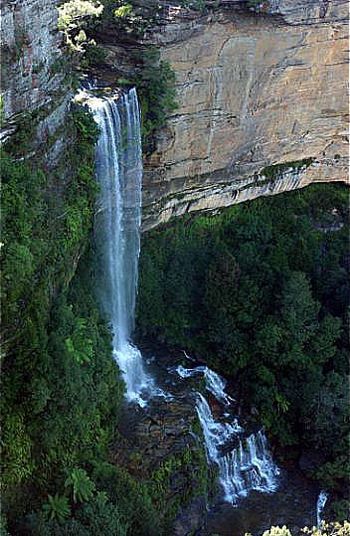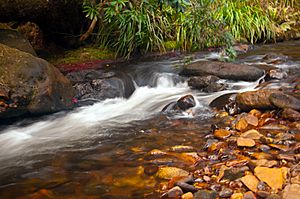Kedumba River facts for kids
Quick facts for kids Kedumba |
|
|---|---|

The Kedumba River flowing over Katoomba Falls, seen from Scenic World, Katoomba, 2013.
|
|
| Lua error in Module:Location_map at line 420: attempt to index field 'wikibase' (a nil value).
Where the Kedumba River meets Lake Burragorang in New South Wales
|
|
| Other name(s) | Kedumba Creek (Part), Katoomba Creek (Part) |
| Country | Australia |
| State | New South Wales |
| Region | Blue Mountains |
| LGAs | Blue Mountains, Wollondilly |
| Physical characteristics | |
| Main source | Blue Mountains Walford Park, Katoomba 556 m (1,824 ft) |
| River mouth | confluence with the Coxs River to form Lake Burragorang Policeman Point, Warragamba 120 m (390 ft) |
| Length | 20 km (12 mi) |
| Basin features | |
| River system | Hawkesbury-Nepean catchment |
| Waterfalls | Katoomba Cascades, Katoomba Falls |
| National park | Blue Mountains National Park |
The Kedumba River is a beautiful river in the Blue Mountains region of New South Wales, Australia. It's part of a bigger river system called the Hawkesbury-Nepean catchment. This means that its waters eventually flow into these larger rivers.
Where the Kedumba River Flows
The Kedumba River starts as a small stream called Kedumba Creek. It begins in Walford Park, which is in a town called Katoomba.
Journey Through Waterfalls and Valleys
As the creek flows, it tumbles over two amazing waterfalls: the Katoomba Cascades and the famous Katoomba Falls. After these falls, the stream becomes the Kedumba River. It then flows down from the Blue Mountains Range.
The river winds its way through two beautiful areas: the Jamison Valley and the Kedumba Valley. Both of these valleys are inside the Blue Mountains National Park. This park helps protect the river and the nature around it.
Meeting Other Rivers
The Kedumba River travels for about 20-kilometre (12 mi) (about 12 miles). During its journey, it drops about 178 metres (584 ft) (about 584 feet) in height! The river's journey ends when it joins another river called the Coxs River. Together, they flow into a large lake known as Lake Burragorang.
 | James B. Knighten |
 | Azellia White |
 | Willa Brown |


